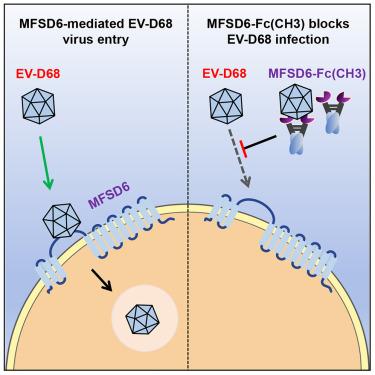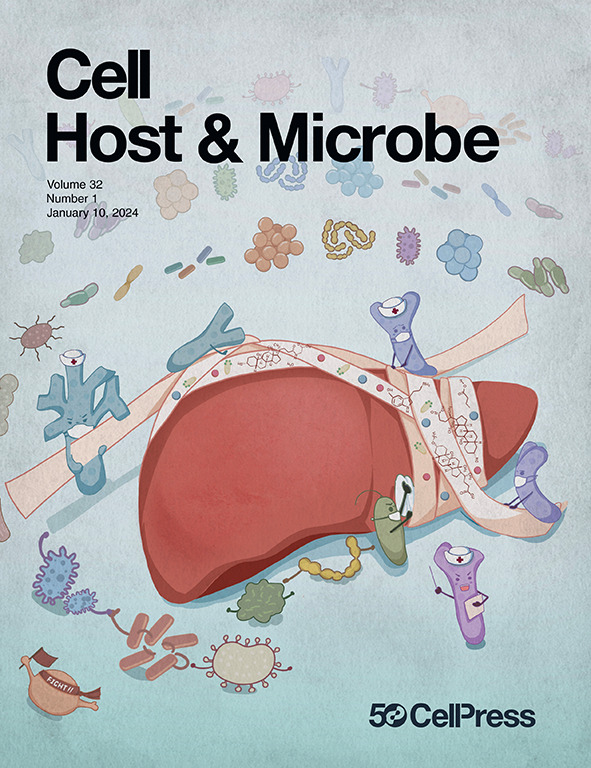MFSD6是呼吸道肠道病毒D68的一种进入受体
IF 20.6
1区 医学
Q1 MICROBIOLOGY
引用次数: 0
摘要
肠病毒D68 (EV-D68)是一种主要的非脊髓灰质炎肠道病毒,可在儿童中引起严重呼吸道疾病和脊髓灰质炎样疾病。病毒进入代表了抗病毒干预的潜在多方面目标;然而,目前还没有批准的阻断EV-D68的抑制剂。在这里,我们确定了功能未描述的膜蛋白主要促进物超家族结构域蛋白6 (MFSD6)作为一种适合治疗干预的EV-D68进入因子。具体来说,MFSD6的表达对于EV-D68的复制至关重要。MFSD6与EV-D68颗粒结合,是病毒附着于细胞所必需的。MFSD6分子的第二个胞外结构域参与EV-D68的识别。基于这些发现,我们设计了一个包含MFSD6外结构域与Fc融合的重组蛋白复合物(MFSD6-Fc(CH3)),它可以有效地抑制EV-D68的摄取。MFSD6-Fc(CH3)能有效阻断EV-D68体外感染,防止新生小鼠死亡。总之,我们的研究不仅确定了MFSD6作为EV-D68的进入因子,而且揭示了一个潜在的抗病毒靶点和治疗剂。本文章由计算机程序翻译,如有差异,请以英文原文为准。

MFSD6 is an entry receptor for respiratory enterovirus D68
Enterovirus D68 (EV-D68) is a leading non-polio enterovirus that causes severe respiratory diseases and poliomyelitis-like illness in children. Viral entry represents a potential multifaceted target for antiviral intervention; however, there are no approved inhibitors to block EV-D68. Here, we identify the functionally undescribed membrane protein major facilitator superfamily-domain-containing protein 6 (MFSD6) as an EV-D68 entry factor amenable to therapeutic intervention. Specifically, MFSD6 expression is crucial for EV-D68 replication. MFSD6 binds to EV-D68 particles and is necessary for virus attachment to cells. The second extracellular domain of the MFSD6 molecule is involved in the recognition of EV-D68. On the basis of these findings, we engineered a recombinant protein complex comprising the MFSD6 ectodomain fused to Fc (MFSD6-Fc(CH3)), which potently inhibited EV-D68 uptake. MFSD6-Fc(CH3) effectively blocked EV-D68 infection in vitro and prevented lethality in newborn mice. In conclusion, our study not only identifies MFSD6 as an EV-D68 entry factor but also reveals a potential antiviral target and therapeutic agent.
求助全文
通过发布文献求助,成功后即可免费获取论文全文。
去求助
来源期刊

Cell host & microbe
生物-微生物学
CiteScore
45.10
自引率
1.70%
发文量
201
审稿时长
4-8 weeks
期刊介绍:
Cell Host & Microbe is a scientific journal that was launched in March 2007. The journal aims to provide a platform for scientists to exchange ideas and concepts related to the study of microbes and their interaction with host organisms at a molecular, cellular, and immune level. It publishes novel findings on a wide range of microorganisms including bacteria, fungi, parasites, and viruses. The journal focuses on the interface between the microbe and its host, whether the host is a vertebrate, invertebrate, or plant, and whether the microbe is pathogenic, non-pathogenic, or commensal. The integrated study of microbes and their interactions with each other, their host, and the cellular environment they inhabit is a unifying theme of the journal. The published work in Cell Host & Microbe is expected to be of exceptional significance within its field and also of interest to researchers in other areas. In addition to primary research articles, the journal features expert analysis, commentary, and reviews on current topics of interest in the field.
 求助内容:
求助内容: 应助结果提醒方式:
应助结果提醒方式:


